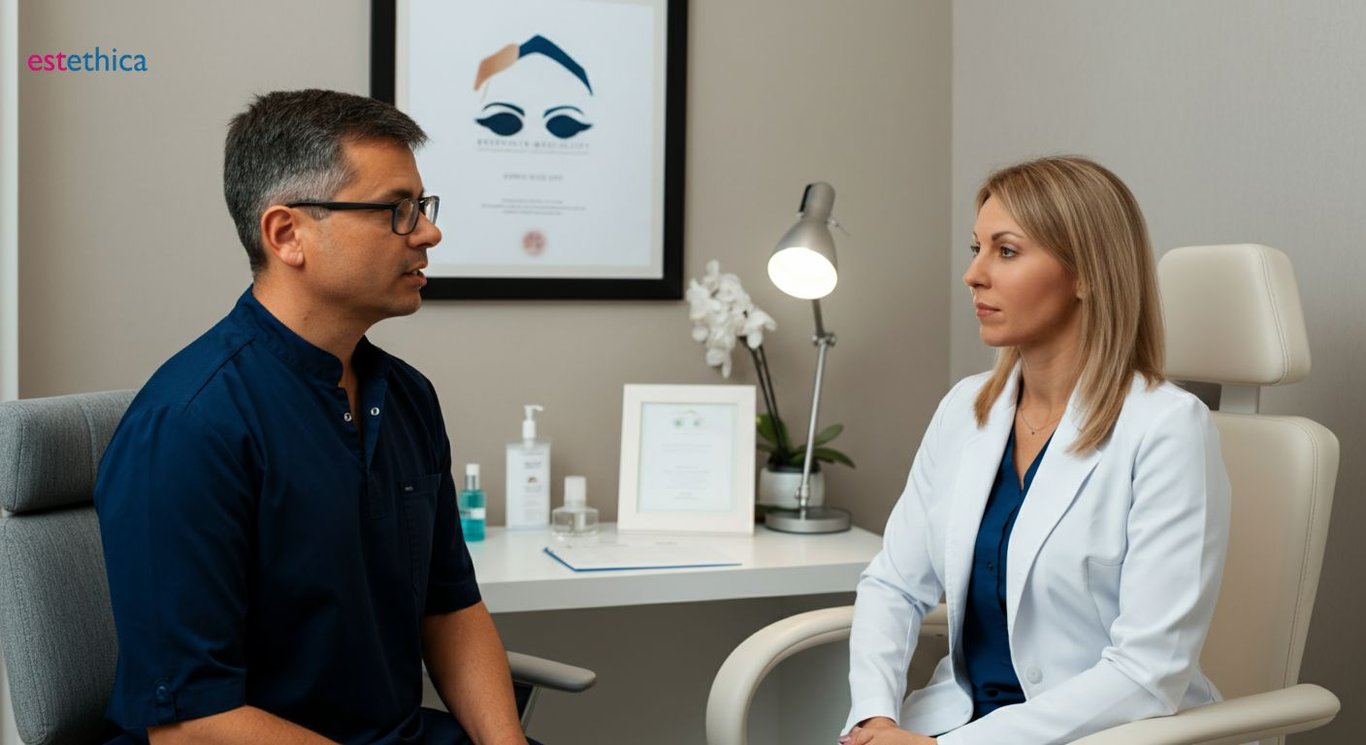Blepharoplasty Insights: Transform Your Look Safely
Transform your look safely with expert blepharoplasty insights.
Blepharoplasty, commonly known as eyelid surgery, offers a remarkable transformation. This procedure not only enhances the aesthetics of the eyes but also improves visual function by removing excess skin and fat. It's a popular choice for individuals looking to rejuvenate their appearance and regain confidence. The decision to undergo blepharoplasty, however, should be well thought out, requiring a good understanding of the procedure, recovery, and potential alternatives. This guide will delve into the essentials of blepharoplasty, helping you make an informed decision that aligns with your beauty goals and lifestyle.
Understanding Blepharoplasty: What You Need to Know
Factors Influencing the Decision for Eyelid Surgery
Blepharoplasty, commonly known as eyelid surgery, is a transformative procedure for those seeking to enhance their facial aesthetics or address functional issues. The decision to undergo this surgery is influenced by various factors, including the desire for a more youthful appearance, improved vision, and enhanced self-esteem. For instance, individuals with drooping eyelids that obscure their vision may find significant functional benefits from the procedure. Additionally, those seeking to achieve a more refreshed and alert look often consider blepharoplasty as a viable option.
Key Considerations Before Surgery
- Consultation with a certified oculoplastic surgeon to discuss goals and expectations.
- Review of medical history and current medications to ensure safety.
- Understanding potential risks and realistic outcomes of the surgery.
Patients must engage in thorough consultations with their surgeons to tailor the procedure to their specific needs. This personalized approach helps in achieving the desired results while maintaining safety and health standards.
Understanding the Procedure and Recovery
- Initial assessment and planning with the surgeon.
- Execution of the surgery, involving skin and muscle adjustments.
- Post-operative care and monitoring for optimal recovery.
The recovery period is crucial for the success of blepharoplasty. Patients often inquire about the blepharoplasty recovery time, which varies based on individual circumstances and the extent of the surgery. Adhering to post-surgery guidelines provided by the surgeon is essential for a smooth recovery and achieving the best possible outcomes.

Eyelid Surgery Recovery: Tips for a Smooth Healing
Managing Post-Surgery Discomfort and Swelling
After undergoing blepharoplasty, managing discomfort and swelling is crucial for a smooth recovery. Patients often experience swelling and bruising around the eyes, which can be alleviated by following specific post-operative care instructions. For instance, keeping the head elevated while resting helps reduce swelling significantly. Additionally, applying cold compresses intermittently during the first few days can further minimize puffiness and bruising.
Steps for a Successful Recovery
- Adhere to prescribed medication and ointment applications to prevent infection and promote healing.
- Avoid wearing contact lenses and engaging in strenuous activities for at least two weeks post-surgery.
- Attend regular follow-up appointments with your surgeon to monitor healing progress and address any concerns.
By diligently following these steps, patients can ensure a smoother recovery process and achieve optimal results from their eyelid surgery. Regular communication with the surgeon is essential to address any unexpected issues promptly.
Additional Tips for Comfort and Healing
- Use over-the-counter pain relievers as recommended by your surgeon to manage discomfort.
- Consider wearing sunglasses outdoors to protect sensitive eyes from sunlight and wind.
- Maintain a balanced diet rich in vitamins to support the body's natural healing processes.
These additional measures can enhance comfort during recovery and contribute to a successful healing journey. By taking proactive steps, patients can enjoy the benefits of their cosmetic eye surgery with minimal complications.

Choosing the Right Surgeon for Your Eyelid Lift
Evaluating Surgeon Credentials and Experience
When selecting a surgeon for blepharoplasty, credentials and experience are paramount. Ensure the surgeon is board-certified in plastic surgery or ophthalmology, with additional specialization in oculoplastic or reconstructive surgery. This specialization is crucial for procedures like fox eye surgery or lateral canthoplasty, which require precision and expertise. Investigate the surgeon's track record by requesting before-and-after photos of previous patients. This visual evidence can provide insight into their skill level and aesthetic style. Additionally, patient testimonials and reviews offer valuable perspectives on the surgeon's approach and competency.
Understanding the Consultation Process
- Discuss the surgeon's technique and how it aligns with your goals.
- Explore potential risks and ensure you have realistic expectations.
- Evaluate the surgeon's comfort and confidence with the planned procedure.
A thorough initial consultation is essential for establishing trust and clarity. During this meeting, the surgeon should explain their technique, anticipated results, and any associated risks. This transparency ensures that you have realistic expectations and that the surgeon feels comfortable with the planned procedure. By understanding the consultation process, you can make an informed decision about your cosmetic eye surgery.
Factors Influencing Eyelid Surgery Costs
- Surgeon's expertise and reputation in the field.
- Complexity of the procedure, such as upper or lower eyelid surgery.
- Geographical location and associated facility fees.
While cost is a consideration, it should not be the sole factor in choosing a surgeon. The expertise and reputation of the surgeon, the complexity of the procedure, and the geographical location can all influence the cost of eyelid surgery. Prioritize finding a qualified and experienced surgeon to ensure the best possible outcome for your blepharoplasty.

Non-Surgical Alternatives: Are They Effective?
Exploring Non-Surgical Eyelid Enhancement Techniques
For individuals seeking to enhance their eyelid appearance without surgery, non-surgical options offer viable solutions. Techniques such as laser therapy, radiofrequency skin tightening, and injectable dermal fillers can subtly improve skin tone and reduce fine wrinkles. These methods are particularly beneficial for those with mild to moderate eyelid sagging, providing a refreshed look with minimal risk and downtime.
Understanding the Limitations and Benefits
- Non-surgical methods require regular maintenance to sustain results.
- Ideal for minor cosmetic adjustments rather than significant changes.
- Consultation with a qualified professional is crucial for tailored advice.
While non-surgical alternatives can offer temporary improvements, understanding their limitations is essential. These methods are not substitutes for surgical procedures like blepharoplasty, which can address more severe issues. However, they are excellent for those seeking minor enhancements without the commitment of surgery.
Steps to Consider Before Choosing Non-Surgical Options
- Research different non-surgical techniques and their effectiveness.
- Consult with an oculoplastic surgeon to discuss potential outcomes.
- Evaluate how these options align with your aesthetic goals and lifestyle.
Before opting for non-surgical eyelid enhancements, thorough research and professional consultation are vital. An oculoplastic surgeon can provide insights into the best approach for achieving your desired look, ensuring that your choice aligns with both your aesthetic goals and lifestyle preferences.
Precision in Blepharoplasty: Advanced Techniques for Optimal Results
Comprehensive Care in Eyelid Surgery: Ensuring Smooth Recovery and Success
Frequently Asked Questions
What is blepharoplasty and why is it performed?
What should I consider before undergoing eyelid surgery?
How can I ensure a smooth recovery after blepharoplasty?
Are there non-surgical alternatives to eyelid surgery?
How do I choose the right surgeon for my eyelid lift?
Discover the path to 'Healthy Beauty' with estethica's expert care. Call now for your free consultation and take the first step towards a more confident you!
📞 Call for Your Free Consultation